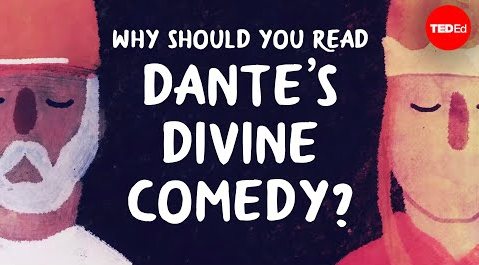"Abandon all hope, ye who enter here..."
“入此门者,当放弃一切希望...”
Inscribed above the Gate of Hell, these ominous words warn dark tidings for Dante as he begins his descent into inferno.
是刻在地狱之门上方的不祥之辞,对开始堕入地狱的但丁预示着阴凶之讯。
Yet despite the grim tone, this prophecy sets into motion what is perhaps the greatest love story ever told;
尽管气氛骇人,这行谶言却辟启了可谓史上最伟大的爱情故事,
an epic journey that encompasses both the human and the divine.
一场人神共存的史诗之旅。
But for Dante to reach benevolent salvation, he must first find his way through Hell.
若要获得仁慈的救赎,但丁必先穿度地狱。
This landscape of torture is the setting for "Inferno,"
这酷滥的景象便是《地狱篇》的设定,
the first in a three-part narrative poem written by Dante Alighieri in the 14th century.
十四世纪,由但丁·阿利吉耶里所作的叙事诗分为三篇,《地狱篇》正为其一。
Casting himself as the protagonist, Dante travels deeper and deeper into Hell's abyss, witnessing obscene punishments distinct to each of its nine realms.
但丁让自己担任主角,他不断深入地狱的严渊,目睹九层地狱中,每一层独有的暴戾惩罚。
Beginning in Limbo, he travels through the circles of Lust, Gluttony, Greed, Wrath, Heresy, Violence, and Fraud,
他开始行迳层层地狱,从灵薄狱到贪色、饕餮、贪婪、愤怒、异教、强暴、欺诈,
to the horrific ninth circle of Treachery, where sinners are trapped under the watchful eyes of Satan himself.
一直到惨怖的第九层:背叛,在那里,罪人被囚于撒旦自己的监视下。
The following two parts, "Purgatorio" and "Paradiso," continue Dante's journey,
随后的《炼狱》与《天堂》二篇继续叙述但丁的历程,
as he scales the Mount of Purgatory and ascends the nine celestial spheres of Heaven.
他身登炼狱山,飞升九重天。
Written together over 10 years, these 3 sections comprise the "Divine Comedy" -- an allegorical imagining of the soul's journey towards God.
这三部曲历时十年撰著,一起构成了《神曲》--对灵魂通往上帝之路刻画了寓言式的幻想。
But Dante's "Divine Comedy" is more than just religious allegory.
不过但丁的《神曲》不仅仅是一则宗教寓言,
It's also a witty, scathing commentary on Italian politics.
还是对意大利政坛的智讽与苛评。
A soldier and statesman from Florence, Dante was staunchly faithful to God, but often critical of the Roman Catholic Church.
但丁是来自佛罗伦萨的士兵和政客,他虽然对神十分虔诚,可依然常常批评罗马天主教会。
He particularly disliked its rampant nepotism and practice of simony, the buying and selling of religious favours such as pardons from sin.
他特别反感教会任人唯亲,并买卖诸如赎罪之类圣职的猖獗行为。
Many groups took advantage of these corrupt customs, but few supported them as much as the Guelfi Neri, or Black Guelphs.
这些恶习让许多团体从中渔利,但谁也不比教皇派黑党更支持这些败俗。
This was a political and religious faction which sought to expand the pope's political influence.
这是一个政治和宗教的派别,以扩大教皇的政治影响为目的。
Dante was a member of the Guelfi Bianchi, or White Guelphs -- who believed Florence needed more freedom from Roman influence.
但丁是教皇派白党的成员,他相信佛罗伦萨需要更多自由,而非教会影响。

As a public representative for the White Guelphs, Dante frequently spoke out against the pope's power,
作为白党的公众代表,但丁经常公然反对教皇的权柄,
until the Black Guelphs leveraged their position to exile him from Florence in 1302.
直到1302年,黑党势力壮大后,他从佛罗伦萨被驱逐出境。
But rather than silencing him, this lifelong exile led to Dante's greatest critique of all.
然而终生的放逐未能让他就此沉默,反倒促使他写出最为杰出的批判。
Dishonored and with little hope of return, the author freely aired his grievances with the Church and Italian society.
包羞忍辱的作者不再企望回迁,他大肆发表自己对教会和意大利社会的不满。
Writing the "Divine Comedy" in Italian, rather than the traditional Latin of the educated elite,
但丁用意大利文书写《神曲》以别于智识阶级所用的拉丁文,
Dante ensured the widest possible audience for his biting political commentary.
这让他的政治苛评通俗易懂、易于流传。
In the "Inferno's" circle of the Wrathful, Dante eagerly witnesses sinners tear Black Guelph Filippo Argenti limb from limb.
在《地狱篇》的愤怒狱中,但丁迫切地见证罪囚将黑党分子菲力普·阿根提的身体肢解。
In the circle of Fraud, Dante converses with a mysterious sinner burning in the circle's hottest flames.
在欺诈狱中,他同一神秘的罪人交谈,那人在最灼热的火焰中焚炙。
He learns that this is Pope Nicholas III,
但丁发现此人是教皇尼古拉三世,
who tells Dante that his two successors will take his place when they die -- all three guilty of simony and corruption.
教皇告诉但丁,他的两位继承者由于受赇并贩卖圣职死后会接替他在地狱的位子。
Despite the bleak and sometimes violent imagery in "Inferno," the "Divine Comedy" is also a love story.
尽管《地狱篇》的意象凄凉且时而残暴,《神曲》却还是部爱情故事。
Though Dante had an arranged marriage with the daughter of a powerful Florentine family,
即便但丁已和佛罗伦萨一个权势家族的千金订了婚,
he had also been unrequitedly in love with another woman since he was nine years old: Beatrice Portinari.
他却从九岁时就单恋着另一名女子:贝阿特丽切·波尔蒂纳里。
Despite allegedly meeting just twice, she became Dante's lifelong muse, serving as the inspiration and subject for many of his works.
虽据说只相遇过两次,她却成了但丁终身的婉恋,成为他诸多作品的灵感与主题。
In fact, it's Beatrice who launches his intrepid journey into the pits of Hell and up the terraces of Mount Purgatory.
也正是贝阿特丽切使他勇敢踏上这趟深入地狱九渊、乘凌炼狱山顶的旅途。
Portrayed as a powerful, heavenly figure, she leads Dante through "Paradiso's" concentric spheres of Heaven until he is finally face-to-face with God.
她被描绘为一位强大且神圣的人物,引领但丁游历《天堂》的九重天,一直到和上帝面对面。
In the centuries since its publication, the "Divine Comedy's" themes of love, sin, and redemption have been embraced by numerous artists
出版后的数世纪,《神曲》围绕爱、罪、救赎的主题受诸多艺术家喜爱,
from Auguste Rodin and Salvador Dali, to Ezra Pound and Neil Gaiman.
从奥古斯特·罗丹、萨尔瓦多·达利到埃兹拉·庞德、尼尔·盖曼。
And the poet himself received his own belated, earthly redemption in 2008, when the city of Florence finally revoked Dante's antiquated exile.
而在2008年,佛罗伦萨销免了但丁旧时的驱逐令,诗人本人也终于获得了迟到的尘世救赎。


